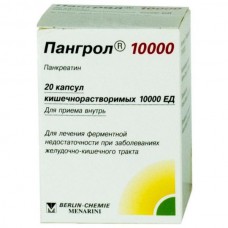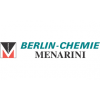Expiration date: 04/2025
The main active ingredient of Pangrol – Pancreatin is a digestive enzyme. The drug has lipolytic, proteolytic and amiloliticescoy action, whereas deficiency of pancreatic enzymes. Pancreatin involved in the digestion of carbohydrates, fats and proteins. The activity of Pangrol is mainly determined by the activity of its constituent enzymes (lipase, trypsin, amylase, and chymotrypsin). The lipase activity and content of trypsin and starch-splitting activity is relevant only in the treatment of cystic fibrosis. Pancreatic enzymes to normalize digestion and improve the functional condition of the digestive system. Trypsin has the ability to suppress the stimulated secretory activity of the pancreas and to provide analgesic effect. Capsule or tablet, as acid, prevents the enzymes from the action of hydrochloric acid in the period when they pass through the stomach. In the small intestine, the shell dissolves, releasing enzymes. The maximum activity of enzymes of Pangrol appears after 40-45 minutes after ingestion.
Indications for use:
Pangrol is prescribed for replacement therapy in various origins exocrine pancreatic insufficiency: chronic pancreatitis, dyspepsia, pankreatectomia, the state after irradiation, cystic fibrosis, diarrhea noninfectious origin flatulence. Pangrol is used for the correction of disorders of digestion (after resection of the small intestine and stomach), for improving the absorption of indigestible fatty, unusual or vegetable food, sedentary way of life, disorders of the functions of the masticatory apparatus, with prolonged immobilization. Pangrol is assigned when gastrocardiac syndrome (syndrome so on), as well as in preparation for carrying out x-ray and other studies of the abdominal cavity for degassing of the intestine.
Method of application:
Tablets or capsules of Pangrol should not be chewed. It is recommended to drink 1 Cup of water or juice. If necessary, the capsule containing mini-tablets may be opened and contents dissolved in liquids.
Pangrol is dosed individually, in accordance with the severity of digestive disorders. Typically, the drug is given before meals for 1-2 caps. (Pangrol 20 000 or 25 000) or 2-4 caps. (Pangrol 10 000). Increasing the dosage of Pangrol is possible only on prescription, depending on the severity of the digestive disorders. The maximum daily dosage of enzymes for children over 12 and adults is 1 kg of body weight 15 000-20 000 U of lipase, in the case of complete exocrine insufficiency – 400 000 IU per day. Dosing of Pangrol and duration of therapy in children from 3 to 12 years old must be a doctor. Generally, per 1 kg of weight of the child is assigned to no more than 1500 IU of lipase. Daily dose for children 1 to 5 years – 50 thousand UNITS, after 1, 5 years – 100 thousand UNITS.
Side effects:
When taking Pangrol may cause allergic reactions of immediate type, is rarely observed disorder of the gastrointestinal tract (nausea, constipation or diarrhoea, epigastric discomfort). In the long admission in high doses may develop hyperuricosuria. When taking high doses of Pangrol with cystic fibrosis, the formation of strictures in the ileocecal Department or in the ascending Department of the colon.
Contraindications:
Pangrol is contraindicated in acute pancreatitis, acute exacerbation of chronic pancreatitis, in case of individual hypersensitivity.
Pregnancy:
Pangrol during pregnancy can be administered by a physician in cases where the expected therapeutic effect for the mother outweighs the potential risk to the fetus.
Interaction with other medicinal products:
With simultaneous use of Pangrol , miglitol and acarbose may be a decrease in hypoglycemic action of the latter.
Overdose:
Cases of overdose not described Pangrol.
Form of issue:
Pangrol 10000
Capsules containing enteric soluble mini pill, No. 20, No. 50
Pangrol 20000
Tablets enteric-soluble shell.
Blister No. 20, No. 50
Pangrol 25000
Capsules containing enteric soluble mini pill, No. 20, No. 50
Storage conditions:
Pangrol is stored at a temperature not exceeding 25·degrees Celsius.
Composition:
Pangrol 10000
1 capsule contains: lipase 10000 IU, amylase 9500 IU, 500 IU of protease.
Other ingredients: croscarmellose sodium, silicon dioxide highly dispersed, the copolymer of methacrylic acid and ethylacrylate, simethicone emulsion 30%, titanium dioxide (E171), cellulose microcrystalline, talc, hydrated castor oil, magnesium stearate, gelatin, triethylcitrate, Indigo Carmine (E132), pigment red galasatary (E 172), pigment yellow galasatary (E172), pigment quinoline yellow (E 104).
Pangrol 25000
1 capsule contains: 25,000 IU of lipase, amylase 22500 IU, IU protease 1250.
Other components: similar to Pangrol 10000.
Pangrol 20000
In 1 tablet contains: lipase 20000 IU, amylase 12000 IU, 900 IU of protease.
Other ingredients: microcrystalline cellulose, silicon dioxide, crospovidone, lactose monohydrate, methylhydroxypropylcellulose, magnesium stearate, simethicone emulsion, titanium dioxide, triethylcitrate, carboxymethylcellulose sodium salt, macrogol 6000, talc, Polysorbate 80.
Additionally:
The application of preparations containing Pancreatin, a decrease of the absorption of folic acid and iron, so with a long reception of Pangrol, it is recommended to appoint preparations of iron and folic acid.
During the application of Pangrol, you must consume a sufficient amount of liquid.
Due to the content in Pangrol active enzymes necessary to swallow pills (capsules), without chewing, to avoid damage to the mucosa of the oral cavity.
Not recommended to appoint Pangrol patients with congenital galactose intolerance, malabsorption syndrome galactose/glucose or lactase deficiency.





